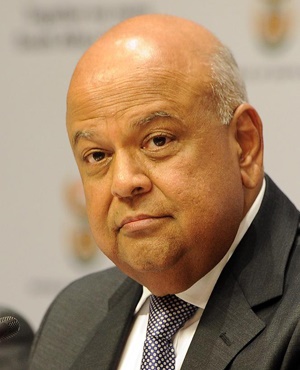Sudáfrica/Marzo de 2017/Fuente: News 24
RESUMEN: Al considerar cómo financiar la educación superior gratuita en el futuro, el gobierno debe abordar el asunto de una manera manejable y equilibrada que no perjudicará el monto del Estado, dijo el viernes el Ministro de Finanzas, Pravin Gordhan. «Tenemos los números, así que tenemos que averiguar cómo, de una manera manejable y equilibrada, cómo el gobierno abordará esa cuestión y esa proposición», dijo Gordhan a la Comisión de Investigación sobre la Educación Superior y la Formación en Centurión. Dijo que cada departamento gubernamental o entidad dentro del gobierno podría justificar por qué necesitaba una porción más grande de la torta fiscal de lo que tenían actualmente, «pero la realidad es que no es así como funciona la vida».
When considering how to fund free higher education in future, government must approach the matter in a manageable, balanced way that will not hurt the state’s purse, Finance Minister Pravin Gordhan said on Friday.
“We’ve got the numbers, so we have to work ouRESUMEN: Al considerar cómo financiar la educación superior gratuita en el futuro, el gobierno debe abordar el asunto de una manera manejable y equilibrada que no perjudicará el monto del Estado, dijo el viernes el ministro de Finanzas, Pravin Gordhan. «Tenemos los números, así que tenemos que averiguar cómo, de una manera manejable y equilibrada, el gobierno aborda esa cuestión y esa proposición», dijo Gordhan a la Comisión de Investigación sobre la Educación Superior y la Formación en Centurión. Dijo que cada departamento gubernamental o entidad dentro del gobierno podría justificar por qué necesitaba una porción más grande de la torta fiscal de lo que tenían actualmente, «pero la realidad es que no es así como funciona la vida».t how, in a manageable and balanced way, government approaches that question and that proposition,” Gordhan told the Commission of Inquiry into Higher Education and Training in Centurion.
He said every government department or entity within government would be able to justify why it needed a bigger slice of the fiscal cake than they currently had, “but the reality is that that’s not how life works”.
“There will always be a tension between requirement and what is available in reality,” Gordhan said.
He said there were times where more money was required in a specific department, and other times where good leadership, good management, good systems, good supervision revealed better results.
“And the same amount of money gives you much better impact.”
Gordhan said there was no “necessarily need” for upheavals in order to attract funding because government already had policies in place to address such problems.
“There has been a policy shift in December 2015 or thereabout and that policy shift required that new funds be found, and that those funds be found in a very constrained environment, and we’ve done our best as the government to find those funds and meet some of the immediate needs that we have whilst at the same time, we all acknowledge that we need to do longer term planning.”
Gordhan also questioned whether it was wise for government to react to such upheavals, at the expense of other government programmes.
“Theoretically it’s possible to shut down half the government programmes, shift all the money to where social upheavals require, nothing stops us from doing that, but is that the responsible thing to do as government?”
Balancing act
He said all South Africans had to ask themselves that questions.
“Like most things in life it’s about a balancing act.”
He said government was now tasked with meeting new requirements by students on one hand, and sustaining the overall requirements of all other South African citizens on the other hand.
“And at the same time, committing oneself, as government and other stakeholders, to process and dialogue and consensus that will more constructively take us in the right direction,” he said.
The Commission, which was established in January 2016, is tasked with investigating the feasibility of free higher education, which a focus on the broader social, economic and financial implications of implementing a fee-free higher education and training in South Africa.
Last year President Jacob Zuma extended the deadline for the fees commission to complete its report to June 30.
He received the Commission of Inquiry into Higher Education and Training’s interim report in November 2016.
The final report was expected to be completed within eight months.
Fuente: http://www.news24.com/SouthAfrica/News/funding-free-higher-education-must-be-sustainable-balancing-act-gordhan-20170304





 Users Today : 43
Users Today : 43 Total Users : 35459949
Total Users : 35459949 Views Today : 49
Views Today : 49 Total views : 3418514
Total views : 3418514